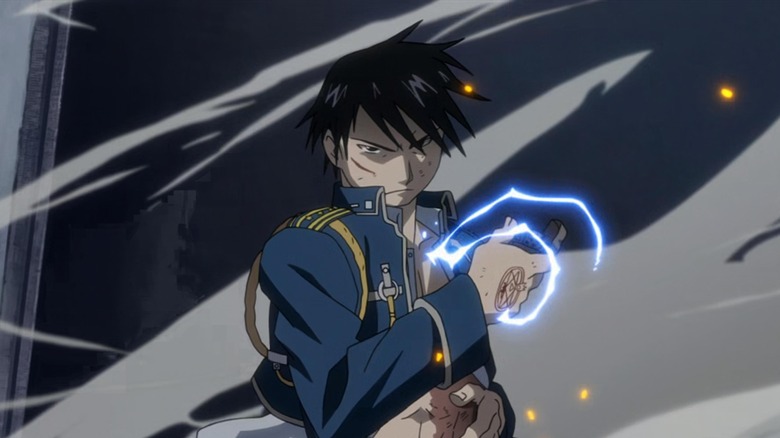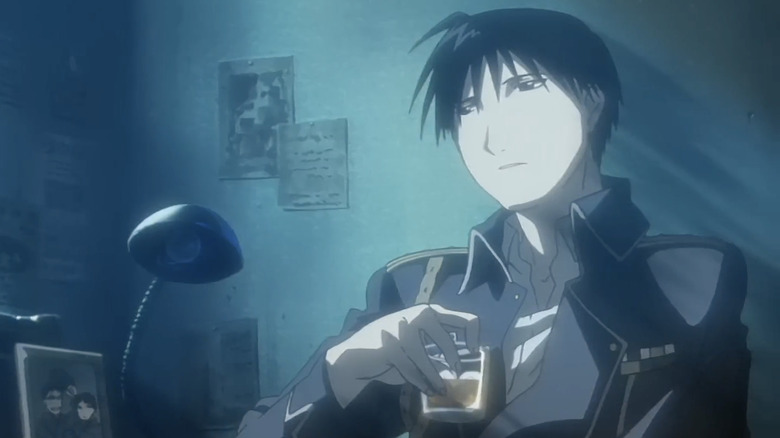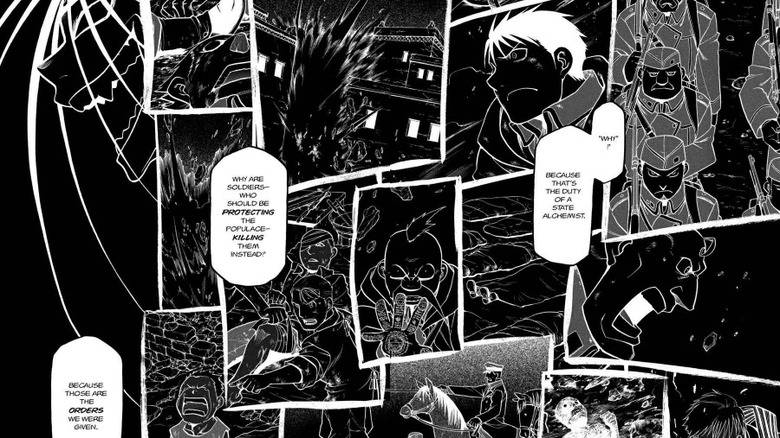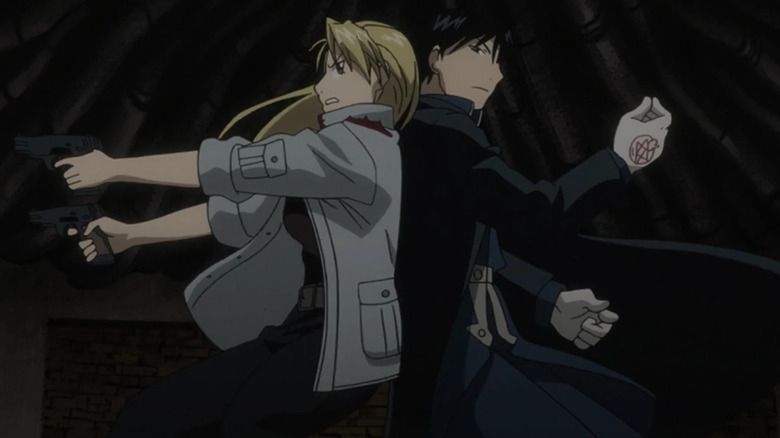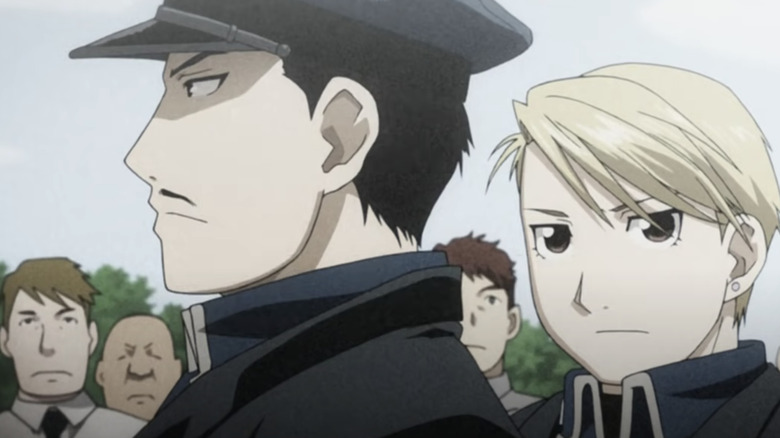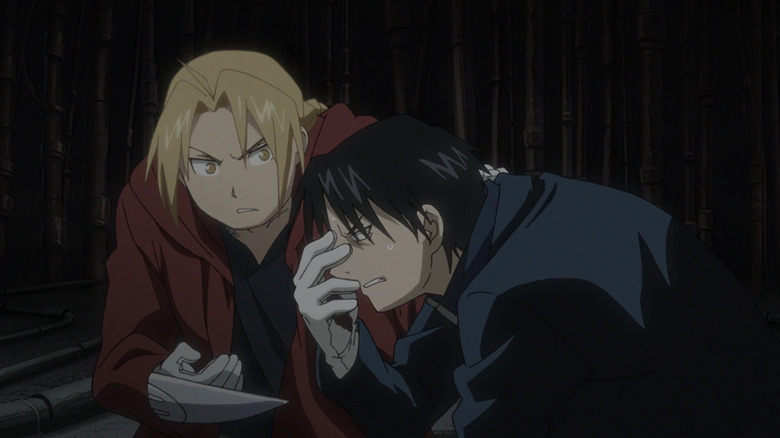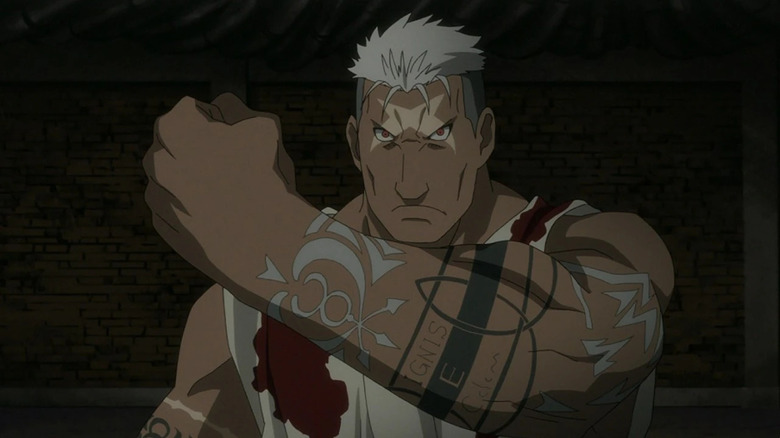The Author Of Fullmetal Alchemist Didn't Want To Give Roy Mustang A Happy Ending
One of the biggest challenges in writing is wrapping things up. If you fail to write a satisfying ending, you can taint your story even for its most dedicated fans. Hiromu Arakawa, author of "Fullmetal Alchemist," testified to this in a 2021 interview with Bessatsu Shonen Magazine. In a conversation with Hajime Isayama (author of "Attack on Titan," which shares many similarities with "Fullmetal Alchemist"), both authors described the difficulties they faced in concluding their stories.
Per Arakawa, her thorniest challenge was the fate of Colonel Roy Mustang — and how much suffering he was due. The overarching theme of "Fullmetal Alchemist" is equivalent exchange: you get what you deserve. Now that Mustang is on the side of the good guys, that's (almost) never in doubt. From his charm to his badass fighting skills to his hilarious love for tiny mini-skirts, it's easy to like Mustang. It's just as easy to forget he has gallons of innocent blood staining his hands.
While most of the heroes get happy endings, Mustang's is more uncertain because his recompense is incomplete.
Who is Roy Mustang?
Mustang is known as the Flame Alchemist, thanks to his ability to ignite fiery explosions with just a snap of his fingers. He's the direct superior of our heroes, brothers Edward and Alphonse Elric. While Ed became a State Alchemist for the resources, Mustang did so because he wanted to help people. Since his homeland of Amestris is locked in war on all sides, Mustang thought the best way to do so was by enlisting in the military. His alchemy teacher, Berthold Hawkeye, recognized what a fool his student was for this.
Mustang failed to see the forest for the trees — Amestris is always at war because it's agitating those conflicts. The country is, after all, a military dictatorship led by Führer King Bradley — that title alone (plus the mustache) should give away that he's bad news. Amestris' militarism doesn't just reach outside its borders either. Due to his enlistment in the military, Hawkeye refused to teach Mustang how to perform Flame Alchemy. So, after he passed, his daughter Riza passed it on to Roy instead; her father had tattooed his research notes on her back.
Riza's condition was that Roy use the skill to help people; she even followed his lead and enlisted, becoming an expert sharpshooter. However, the two soon learned what soldiers "serving their country" really meant when they were deployed to the eastern region Ishval.
The Ishvalan Extermination
The Ishvalans are brown-skinned, white-haired, red-eyed monotheists who joined Amestris for the benefits of being part of an empire. However, their beliefs prohibit alchemy, believing it distorts the vision of their god Ishvala. These cultural differences spark discontent, culminating in civil war after an Amestrian soldier shot an Ishvalan child. Seven years on, Bradley decides on genocide and deploys the State Alchemists as human weapons to wipe out the Ishvalans. Herein are the lies of patriotism; it's not the people the military serves, but the state.
When Mustang looks around in Ishval, from Hawkeye to his best friend Maes Hughes to his own reflection, all he sees are the eyes of killers. But despite their own misgivings, none of them disobey their orders. The last Ishvalan who Mustang kills senses his unease, and so tells him: "I'll never forgive you."
But Solf J. Kimblee, the Crimson Alchemist, admonishes his comrades for their guilt. It was their choice to put on their uniforms, so they can't cry about killing people now. Mustang, Hawkeye, and Hughes agree; they can't wallow in their guilt, so they have to channel it to productive ends instead.
Mustang decides he has to "climb to the top of the rat's nest" — replace Bradley as Führer, democratize Amestris, de-arm the military, and hold the "heroes" of Ishval accountable, including himself and his comrades. Hawkeye and Hughes stay by his side to keep him on the straight and narrow.
Hawkeye regrets giving Roy Flame Alchemy after seeing how he used it in Ishval. So, she has him burn her back to destroy the secrets encoded in her tattoos. The key to destruction dies with Mustang, so no one will use it to carry out evil the way he did again.
A duty to make amends
Making amends for your sins is a recurrent idea in "Fullmetal Alchemist." It's what Ed and Al's journey is about. They tried to revive their dead mother, violating the laws of nature, and paid the price (Ed lost an arm and leg, Al's soul is trapped in a suit of armor). They're searching for the Philosopher's Stone to heal their bodies, but also to absolve themselves; they feel mutually guilty for what happened to the other.
At the same time, the series deconstructs the supposed nobility of self-sacrifice. When Ed nearly gives his life for Al, the younger Elric calls his big brother's effort a waste: "Survival is the only way, Ed! Live on, learn more about alchemy! You can find a way to get our bodies back [...] I won't allow you to abandon the possibility of hope, and choose a meaningless death."
When Hawkeye tells Ed about her and Mustang's plans, he admonishes her, practically quoting Al's words. Hawkeye counters that she and Roy aren't choosing martyrdom, but duty. They can't restore the lives they took, so they have to devote their own to helping the remaining Ishvalans. That means tearing down the system that crushes them, and if their victims' relatives decide they still need to be punished after that, so be it.
When Ed next sees Mustang, he refuses to return some money (520 "cens," or coins) he borrowed earlier from the Colonel. Instead, he'll return it when Mustang becomes Führer. Then he'll borrow more money and keep that until Amestris is a democracy, and so on and so forth. The paltry sum isn't the point though; it's Ed letting Roy know that he's joined Riza in keeping him accountable.
Looking to an uncertain future
So, where does "Fullmetal Alchemist" leave Mustang and Hawkeye? For starters, that 520 Cens Promise hasn't been fulfilled yet, because while Ed's journey is over, Mustang's isn't. Mustang's superior General Grumman becomes the new Führer, so Amestris is neither demilitarized or democratized yet. But Mustang isn't waiting for a promotion before beginning his atonement.
For one, he gets the occupation of Ishval lifted, allowing the genocide survivors to return to their land. Next, he plans to spearhead a revitalization of Ishval by making it a center of trade between Amestris and the eastern country Xing. To help with these negotiations, he's shown researching Ishvalan culture and farming. Hawkeye notes, "We know this won't erase our sins, but it's not too late to fix things."
The last page of "Fullmetal Alchemist" (and the end credits of the anime, "Fullmetal Alchemist: Brotherhood") is a montage of photos showing what the characters are up to years later. Mustang and Hawkeye are still side-by-side, and while the Colonel looks ahead, he isn't smiling. In her Bessatsu interview, Arakawa said this was intentional to show his uncertain future.
Blind to his vision
Now, there's one part of the Colonel's fate where he gets off a bit light. As part of the villainous Homunculi's plans, Mustang is forced to open the Gate of Truth via human transmutation. Like Ed and Al did, he loses part of himself: his eyesight. The irony is that a man with a grand vision for the future is rendered blind.
Dr. Marcoh, an alchemist who created a Philosopher's Stone (with the souls of captured Ishvalans), offers to restore Mustang's eyesight with that stone. Marcoh wants to atone for his part in the Ishvalan extermination too. Since Mustang is going to devote himself to helping the Ishvalans, Marcoh wants the Colonel to do so to the best of his ability.
Considering Mustang's crimes are abundantly clear, his blindness could be seen as a warranted punishment. However, "Fullmetal Alchemist" doesn't believe in suffering for suffering's sake. I think that's most clear in the arc of another character: Scar, one of the Ishvalan genocide's victims.
Don't suffer, rebuild
"Scar," known as such because of the x-shaped scar on his forehead, was an Ishvalan warrior priest — his family and town were wiped out by Kimblee. However, his brother was an aspiring alchemist with transmutation sigils tattooed on his arm. He saved Scar's life by transmuting his own right forearm onto Scar's severed stump.
Scar has only a death drive left when the story begins. He wants to kill the State Alchemists like they killed his people and sees no future for himself beyond that. Alchemy consists of analysis, deconstruction, and reformation, so he stops at the second step to destroy his victims' bodies. When Scar comes across a camp of Ishvalan survivors, his old teacher admonishes him:
"Enduring and forgiving are two different things. You must not forgive the cruelty of this world. It's our duty as human beings to be angry at injustice. But we must also endure it, because someone must sever this chain of hatred."
Before the death of Scar's brother, he taught Scar about alchemy's idea of the world's flow: "If negative feelings pervade our world, the flow of the world will become negative." Scar abandoning his revenge quest coincides with him embracing the reconstructive side of alchemy; he's realized that despite all he's lost, there's a purpose to his life beyond death. Sure enough, the story ends with Scar returning to Ishval to help lead his country into a new age.
If I'm honest, Scar and Mustang's complementary arcs hew a bit too far on the naïve side of idealism for me; more recent media handle similar set-ups with clunky, reactionary framing. However, Arakawa's ideas are executed as well as they can be and tie into the tapestry of her story. One is all, all is one indeed.
